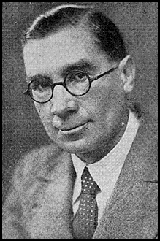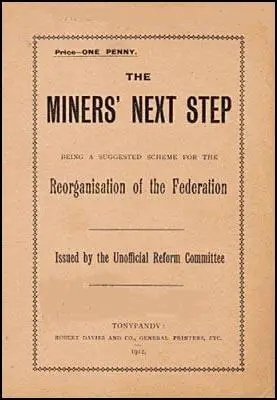William H. Mainwaring

William Henry Mainwaring, the third of the ten children of William Mainwaring, a miner, and his wife, Mary Thomas Mainwaring, was born at Penderry on 14th January 1884. After a brief education he found work at the Broad Oak Colliery. In 1903 Mainwaring moved to the Rhondda valleys, where he found work in Clydach Vale.
As a young man he was converted to socialism after reading the novels of Edward Bellamy. He joined the Social Democratic Federation before moving on to the Independent Labour Party (ILP). "His political beliefs led to a crisis in his relations with his Baptist church, and he was expelled from the church for refusing to believe that Lot's wife had been turned into a pillar of salt. Thereafter he remained a non-Christian rationalist." (1)
Noah Ablett was a miner from Porth who won a scholarship to Ruskin College. Ablett set up Marxist tutorial classes in the central valleys of the Welsh coalfield. In January 1909, Ablett and some of his followers established the Plebs League, an organisation committed to the idea of promoting left-wing education amongst workers. Over the next few weeks branches were established in five towns in the coalfield. One of his first recruits was Mainwaring. (2)
William H. Mainwaring and Syndicalism
Mainwaring became a supporter of the syndicalist ideas of Tom Mann, who had started publishing The Industrial Syndicalist in July 1910. (3) In the first edition he argued: "The workers should realize that it is the men who manipulate the tools and machinery who are the possessors of the necessary power to achieve something tangible, and they will succeed just in proportion as they agree to apply concerted action." Mann went on to say that syndicalism was "revolutionary in aim because it will be out for the abolition of the wages system" and "revolutionary in method, because it will refuse to enter into any long agreements with the masters." (4)
In 1910 Mainwaring helped to establish the Unofficial Reform Committee, a Rhondda-based grouping of union militants that was increasingly drawn towards syndicalism and the principles of industrial unionism. He served as it secretary for the next three years. In 1913 he won a scholarship to the Central Labour College (CLC), an institution that was financially supported by the South Wales Miners' Federation (SWMF) and the National Union of Railwaymen (NUR). (5)
The Miners' Next Step
In 1912 Mainwaring joined forces with Arthur J. Cook and Noah Ablett to produce the pamphlet, The Miners' Next Step. It stated: "That the organisation shall engage in political action, both local and national, on the basis of complete independence of, and hostility to all capitalist parties, with an avowed policy of wresting whatever advantage it can for the working class... Today the shareholders own and rule the coalfields. They own and rule them mainly through paid officials. The men who work in the mine are surely as competent to elect these, as shareholders who may never have seen a colliery. To have a vote in determining who shall be your fireman, manager, inspector, etc., is to have a vote in determining the conditions which shall rule your working life. On that vote will depend in a large measure your safety of life and limb, of your freedom from oppression by petty bosses, and would give you an intelligent interest in, and control over your conditions of work. To vote for a man to represent you in Parliament, to make rules for, and assist in appointing officials to rule you, is a different proposition altogether." (6)

The pamphlet was attacked by the national press. The Spectator argued: "The present plan of campaign of the Syndicalists both here and in France can only be described as sheer immorality. The advice given to miners in the famous little pamphlet called The Miners' Next Step, to destroy their employers' profits by shirking work, must create a state of mind which would be fatal to any group of co-operators.... The truth is that Syndicalism at this moment must not be judged from the point of view of its philosophic conception of co-operative industries owned and controlled by the persons working in them, but must be looked at primarily as a revolutionary movement... For whereas a Syndicalist strike has for its object the diversion of some of the employer's profits into the workmen's pocket, the method by which this end is to be attained is the infliction of suffering and misery upon persons who have no direct part in the quarrel. That is a method of industrial warfare which no nation can afford to tolerate." (7)
William H. Mainwaring was opposed to the First World War and was active in the No Conscription Fellowship. On 19th December 1914 he married Jessie Hazell, the daughter of Thomas John Hazell, railway signalman. They had a daughter, Joyce. On returning to the Rhondda valleys he went back to mining, but also began to teach evening classes and developed a reputation as a follower of Karl Marx with a "caustic tongue". (8)
House of Commons
In 1919 he became vice-principal of the Central Labour College. He was not universally popular as a lecturer, being a target of the student strike of 1922–3. He was an early member of the Communist Party of Great Britain (CPGB). However, he resigned from the party in 1924 and rejoined the Labour Party. Mainwaring "remained, intellectually, a professed Marxist, and was frequently dismissive of what he termed the ‘boy-scout’ Marxism of prominent members of the Communist Party." (9)
Mainwaring was a member of South Wales Miners' Federation (SWMF) executive council. This was a difficult time for the union, with widespread victimization of union activists after the 1926 defeat and bitter strife between Communist and Labour Party members within the union. During this period Mainwaring gradually rejected his militant views and was prominent in bringing about the expulsion of the communist-dominated Mardy lodge from SWMF in 1930. (10)
David Watts Morgan, the Labour Party MP for the Rhondda East constituency, died on 23rd February, 1933, Mainwaring was selected as Labour candidate and won the by-election, beating Arthur Horner, the CPGB candidate. In the 1935 General Election he defeated Harry Pollitt, the general secretary of the CPGB. Pollitt also stood against him in the 1945 General Election, and only lost by 972 votes.
His biographer, Chris Williams, points out: "Mainwaring was a man who inspired respect among his political colleagues rather than affection. Many thought him egotistical and conceited, with a predilection for bombastic denunciation. In an age when his Communist rivals were often seen as leaders of mercurial brilliance, Mainwaring was deemed to lack charisma and imagination." (11)
William H. Mainwaring died at his daughter's home, 38 Harbord Road, Oxford, on 18th May 1971.
Primary Sources
(1) Chris Williams, William H. Mainwaring : Oxford Dictionary of National Biography (2004-2014)
Mainwaring's political consciousness was stimulated by his reading the American Edward Bellamy's utopian socialist novel Looking Backward (1888). He was a member of the Social Democratic Federation and of its Marxian club at Blaenclydach, before joining the Independent Labour Party and the Plebs' League. His political beliefs led to a crisis in his relations with his Baptist church, and he was expelled from the church for refusing to believe that Lot's wife had been turned into a pillar of salt. Thereafter he remained a non-Christian rationalist.
Active in the South Wales Miners' Federation (SWMF) lodge at the Cambrian colliery, Mainwaring served on the Cambrian Combine committee and was prominent in the Cambrian Combine dispute of 1910–11. He helped to establish the Unofficial Reform Committee, a Rhondda-based grouping of union militants that was increasingly drawn towards the principles of industrial unionism, and he acted as the committee's secretary from 1910 until 1913. He participated in the discussion and writing of the committee's influential semi-syndicalist pamphlet The Miners' Next Step (1912), which called for the reform of the SWMF along ‘fighting lines’ and embodied a fierce critique of the existing union leadership. He also contributed regularly to the radical weeklies the Rhondda Socialist Newspaper and the South Wales Worker. At the same time he led the call for the establishment of a formal Labour Party organization in the Rhondda valleys.
(2) Kenneth O. Morgan, Labour People: Leaders and Lieutenants (1987)
Marxists such as Noah Ablett and other young ideologues like Will Mainwaring and Will Hay were ceaselessly active throughout South Wales, contributing to Tom Mann's syndicalist publications, expounding the truths of Marxist economics and sociology, propounding a class-based attitude towards the industrial controversies of the day. Ironically enough, Ablett was hailed locally as illustrating the dialectical and philosophical skills of "the Oxford man", hitherto associated only with bourgeois institutions such as Jesus College. His main activity focused on the Unofficial Reform Committee based on Tonypandy, in the heart of the Rhondda.
(3) Paul Davies, A. J. Cook (1987)
It is revealing that of the South Wales syndicalists to emerge by 1912 Ablett, Cook, George Dolling, W. H. Mainwaring and others had all been (or still were) members of the ILP. This trend towards syndicalism within the ILP was supplemented from the early months of 1909 by the activities of the Plebs League, which had been founded at Ruskin to promote left-wing education amongst workers. Within weeks Plebs branches had been established in five towns in the coalfield, including Porth and Tonypandy.
Student Activities
The Coal Industry: 1600-1925 (Answer Commentary)
Women in the Coalmines (Answer Commentary)
Child Labour in the Collieries (Answer Commentary)
Child Labour Simulation (Teacher Notes)
1832 Reform Act and the House of Lords (Answer Commentary)
The Chartists (Answer Commentary)
Women and the Chartist Movement (Answer Commentary)
Benjamin Disraeli and the 1867 Reform Act (Answer Commentary)
William Gladstone and the 1884 Reform Act (Answer Commentary)
Richard Arkwright and the Factory System (Answer Commentary)
Robert Owen and New Lanark (Answer Commentary)
James Watt and Steam Power (Answer Commentary)
Road Transport and the Industrial Revolution (Answer Commentary)
Canal Mania (Answer Commentary)
Early Development of the Railways (Answer Commentary)
The Domestic System (Answer Commentary)
The Luddites: 1775-1825 (Answer Commentary)
The Plight of the Handloom Weavers (Answer Commentary)
Health Problems in Industrial Towns (Answer Commentary)
Public Health Reform in the 19th century (Answer Commentary)
Walter Tull: Britain's First Black Officer (Answer Commentary)
Football and the First World War (Answer Commentary)
Football on the Western Front (Answer Commentary)
Käthe Kollwitz: German Artist in the First World War (Answer Commentary)
American Artists and the First World War (Answer Commentary)
References
(1) Chris Williams, William H. Mainwaring : Oxford Dictionary of National Biography (2004-2014)
(2) Paul Davies, A. J. Cook (1987) page 11
(3) Tom Mann, Memoirs (1923) page 206
(4) Tom Mann, The Industrial Syndicalist (January, 1910)
(5) Kenneth O. Morgan, Labour People: Leaders and Lieutenants (1987) page 73
(6) Arthur J. Cook, Noah Ablett and William H. Mainwaring, The Miners' Next Step (1912) pages 19-20
(7) The Spectator (30th March, 1912)
(8) Sylvia Pankhurst, The Home Front: A Mirror to Life in England during the World War (1932) page 412
(9) Chris Williams, William H. Mainwaring : Oxford Dictionary of National Biography (2004-2014)
(10) The Times (20th May 1971)
(11) Chris Williams, William H. Mainwaring : Oxford Dictionary of National Biography (2004-2014)
